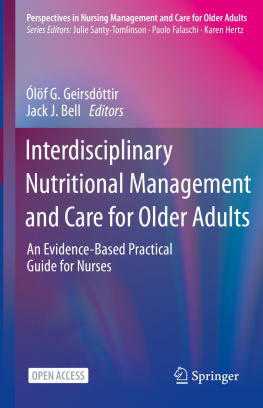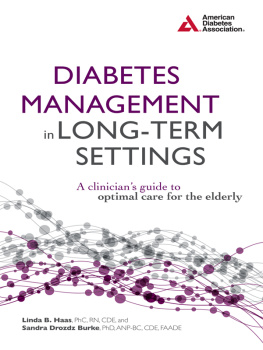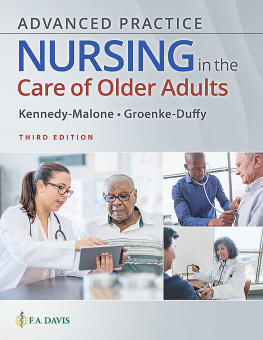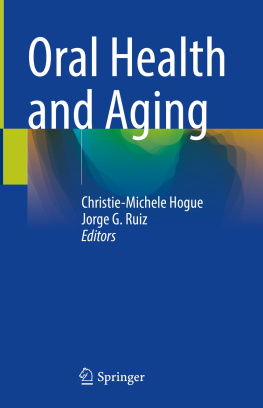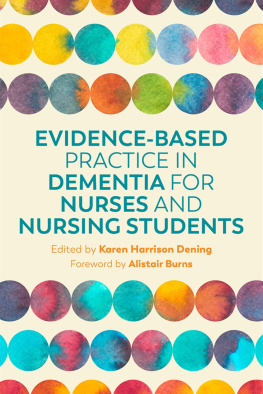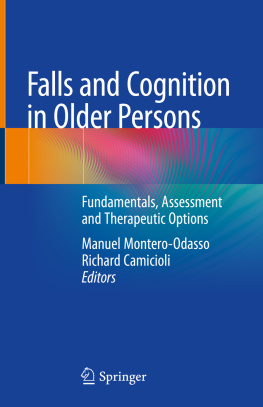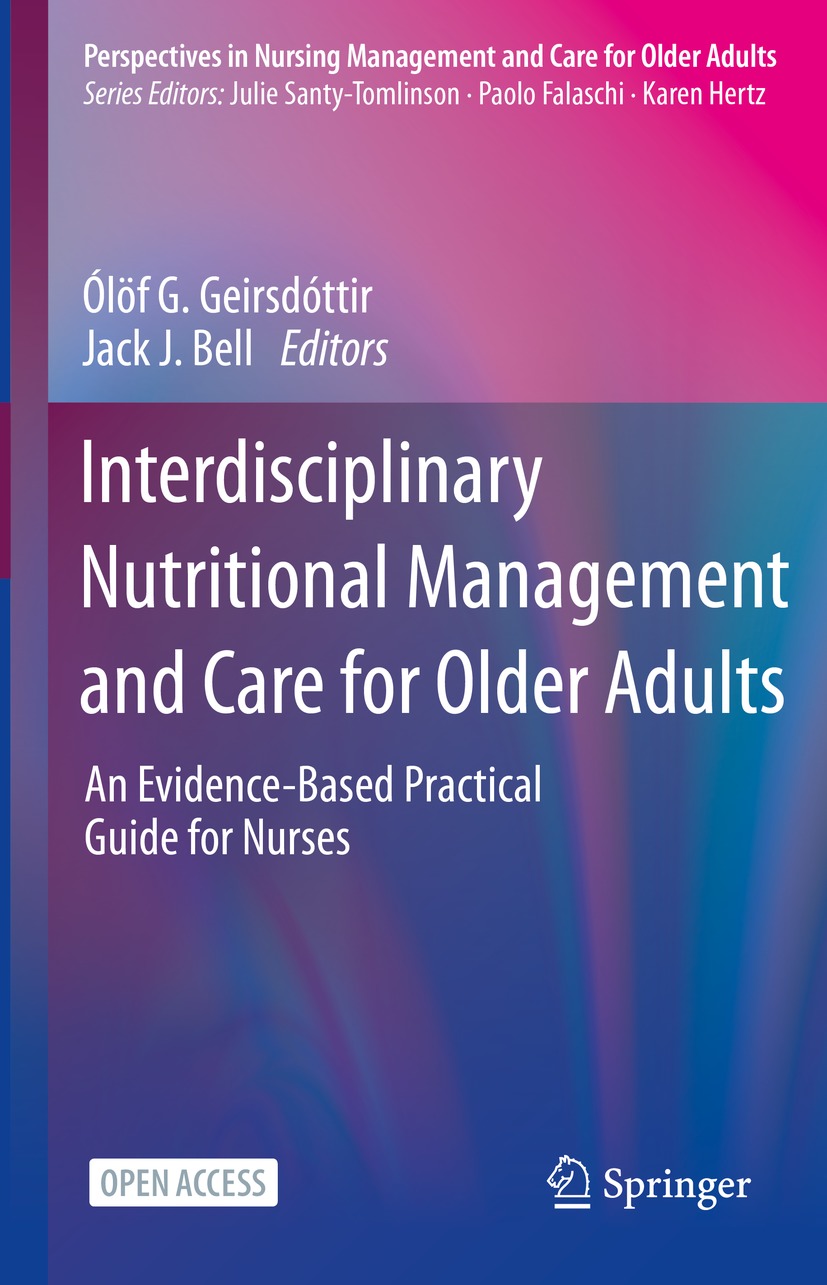Perspectives in Nursing Management and Care for Older Adults
Series Editors
Julie Santy-Tomlinson
Orthopaedic Nursing, Odense University Hospitals/University of Southern Denmark, Odense, Denmark
Paolo Falaschi
SantAndrea Hospital, Sapienza University of Rome, Rome, Italy
Karen Hertz
University Hospitals of North Midlands, Royal Stoke University Hospital, Stoke-on-Trent, Staffordshire, UK
The aim of this book series is to provide a comprehensive guide to nursing management and care for older adults, addressing specific problems in nursing and allied health professions. It provides a unique resource for nurses, enabling them to provide high-quality care for older adults in all care settings. The respective volumes are designed to provide practitioners with highly accessible information on evidence-based management and care for older adults, with a focus on practical guidance and advice.
Though demographic trends in developed countries are sometimes assumed to be limited to said countries, it is clear that similar issues are now affecting rapidly developing countries in Asia and South America. As such, the series will not only benefit nurses working in Europe, North America, Australasia and many developed countries, but also elsewhere. Offering seminal texts for nurses working with older adults in both inpatient and outpatient settings, it will especially support them during the first five years after nurse registration, as they move towards specialist and advanced practice. The series will also be of value to student nurses, employing a highly accessible style suitable for a broader readership.
More information about this series at http://www.springer.com/series/15860
Editors
lf G. Geirsdttir and Jack J. Bell
Interdisciplinary Nutritional Management and Care for Older Adults
An Evidence-Based Practical Guide for Nurses
1st ed. 2021

Logo of the publisher
Editors
lf G. Geirsdttir
Faculty of Food Science and Nutrition, School of Health Science, University of Iceland, Reykjavk, Iceland
Jack J. Bell
Allied Health, The Prince Charles Hospital, Chermside, Queensland, Australia
School of Human Movement and Nutrition Sciences, The University of Queensland, St Lucia, QLD, Australia
ISSN 2522-8838 e-ISSN 2522-8846
Perspectives in Nursing Management and Care for Older Adults
ISBN 978-3-030-63891-7 e-ISBN 978-3-030-63892-4
https://doi.org/10.1007/978-3-030-63892-4
The Editor(s) (if applicable) and The Author(s) 2021
This book is an open access publication.
Open Access This book is licensed under the terms of the Creative Commons Attribution 4.0 International License ( http://creativecommons.org/licenses/by/4.0/ ), which permits use, sharing, adaptation, distribution and reproduction in any medium or format, as long as you give appropriate credit to the original author(s) and the source, provide a link to the Creative Commons license and indicate if changes were made.
The images or other third party material in this book are included in the book's Creative Commons license, unless indicated otherwise in a credit line to the material. If material is not included in the book's Creative Commons license and your intended use is not permitted by statutory regulation or exceeds the permitted use, you will need to obtain permission directly from the copyright holder.
The use of general descriptive names, registered names, trademarks, service marks, etc. in this publication does not imply, even in the absence of a specific statement, that such names are exempt from the relevant protective laws and regulations and therefore free for general use.
The publisher, the authors and the editors are safe to assume that the advice and information in this book are believed to be true and accurate at the date of publication. Neither the publisher nor the authors or the editors give a warranty, expressed or implied, with respect to the material contained herein or for any errors or omissions that may have been made. The publisher remains neutral with regard to jurisdictional claims in published maps and institutional affiliations.
This Springer imprint is published by the registered company Springer Nature Switzerland AG
The registered company address is: Gewerbestrasse 11, 6330 Cham, Switzerland
Foreword
When an older person is recovering or rehabilitating following an episode of ill health, injury, or surgery, one of the most important things those caring for them can do is to make sure that the nutritional aspects of their care are prioritised. Well-nourished patients are a sign of good quality care. Lack of enough to eat and drink is both a care quality and a patient-safety issue because of the fundamental importance of food and water to human life and the associated threats to health, well-being, and life. Malnourishment and dehydration are strongly linked with functional decline, frailty, sarcopenia, falls and fragility fracture in older people along with many other complications and health challenges including problems with rehabilitation and full recovery. Food and drink brings pleasure, and mealtimes are also social occasions which support social and mental well-being: facets that can be lost during both acute and chronic ill health. Without good nutrition, recovery from health challenges, injury, and surgery is, at best, delayed and, at worst, impossible. Health and social care services are failing those older people whose undernutrition and malnutrition are either not recognised or recognised but inadequately acted upon.
This book is one in a series entitled Perspectives in Nursing Management and Care for Older Adults ( https://www.springer.com/series/15860 ). The series aims to provide a comprehensive guide to nursing management and care for older adults, addressing specific problems in nursing and allied health professions. It provides a unique resource for nurses, enabling them to provide high-quality care for older adults in all care settings. The respective volumes are designed to provide practitioners with highly accessible information on evidence-based management and care for older adults, with a focus on practical guidance and advice. This title is central to that aim. Both the series and this title were conceived by the Fragility Fracture Network ( https://www.fragilityfracturenetwork.org/ ). Consequently, some of the discussion is based in the orthogeriatric setting. Even so, the information provided and learning offered are equally transferrable to other settings in which care is provided to older people.
An overarching theme within this book is the fundamental importance of an interdisciplinary approach to nutritional care. The intended audience for this book is all health professionals working with older people so it will be of use to anyone providing geriatric care in any setting. Even though the book speaks to all health and social care professionals, all of whom have responsibility for food and nutrition, it has greatest significance for the nursing team. This is not because nurses bear greater responsibility for nutrition than other members of the interdisciplinary team, but because in most clinical settings there are usually more nurses than other professionals and nurses spend more time with patients, particularly when they are eating. Nurses are often champions of good nutrition and can help to put nutritional care high on the agenda of the entire team so that full collaboration of every team member can have the greatest benefit and positive impact on patient outcomes. It is of note that much of the research considering the impact of educating health professionals about nutrition is focused on medical practitioners and medical students. In fact, the influence of the nursing team is likely to be much greater because of their close clinical proximity to patients and much more can be done to ensure that they are well informed and educated as well as able to act on that knowledge and understanding through timely appropriate nutritional interventions.

